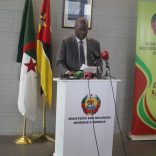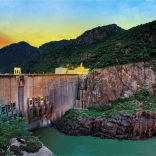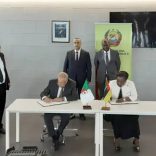Gemfields sells Fabergé eggs maker for $50 million; to use proceeds for capital at Mozambique and ...
Undisclosed debt and financial crisis will not deter Anadarko’s investment decision

The vice president of the oil company says that the undisclosed debt scandal and the difficult financial situation in Mozambique will not deter the company from investing in gas exploration.
“We are aware of Mozambique’s debt problems and while the government works on this, we are working hard to define a set of agreements with the government that will lay the foundation for the definitive sales agreements with liquid natural gas customers” said John Christiansen, Anadarko vice president with responsibility for communications.
“As soon as these agreements and financing are finalised, we will be in a position to take a final investment decision” on the construction of a liquified natural gas terminal, Christiansen told financial news agency Bloomberg.
Anadarko and Eni, who will now have to postpone their 2018 target for the start of Mozambican gas exports, are the two main companies investing in the exploitation of Mozambique’s natural gas reserves, which are among the largest of world.
Mozambique could receive US$212,000 million during the project period from Anadarko’s Area 1 concession alone, according to a 2014 study by Standard Bank, which calculates that Mozambican economy could grow nine-fold by 2035.
The investments in this sector could reach US$100 billion dollars and boost the country’s GDP by about 24 percent per year between 2021 and 2025, when LNG extraction is fully operational, according to the calculations made by the International Monetary Fund (before the disclosure of state-guaranteed debt worth more than US$1.4 billion kept off the country’s accounts).
The disclosure of these loans led to the suspension of IMF financing and international aid, and caused the rating agencies to lower the country’s rating into non-investment, or ‘junk’, territory, increasing financing costs.
Financial difficulties and the rising cost of debt, with Moody’s estimating a further US$250 million in undisclosed loans, have already led to Mozambique Asset Management failing to make a debt repayment, and Airports of Mozambique announcing it is seeking to restructure US$500 million in debt .
For the head of the oil and gas sector at BMI consultancy, Christopher Haines, the recent announcement that the South African oil company Sasol expects to significantly increase the supply of electricity in Mozambique through the processing of new gas reserves in Inhambane province with an initial investment of US$1.4 billion (EUR 1.2 billion) is good news, but not enough to change the country.
“South Africa can could up being a pioneer in Mozambique LNG, and certainly benefit from the advantage of short distances, but volumes would likely be small,” Haines told Bloomberg.
“Mozambique needs to ensure long-term contracts with India and Japan, and probably a higher price of oil, for Anadarko to be able to borrow enough money without paying astronomically high interest rates,” he said.
Chris Holmes, of American consultancy IHS Energy, says speed will be a key factor.
“If someone in the projects proceeds with the Final Decision of Investment and is ready to start producing in the early 2020s, then they will enter the market precisely at a time when supply and demand are balanced. If Mozambique misses this window of opportunity, then it will be just one of many countries trying to exploit the next window of opportunity,” the analyst said.













Leave a Reply
Be the First to Comment!
You must be logged in to post a comment.
You must be logged in to post a comment.